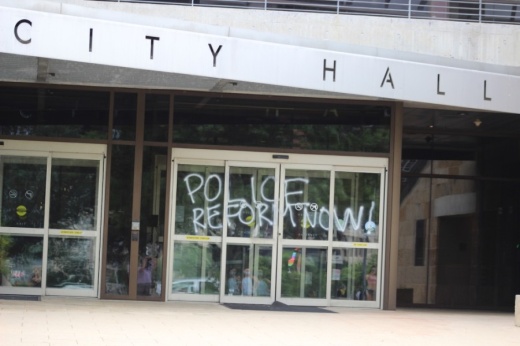Manley answered questions all morning regarding the police department’s tactics during last weekend’s protests, which saw police officers firing bean bag bullets indiscriminately into crowds as well as using tear gas and pepper spray on protesters. Austin’s EMS chief said 29 people were taken to the hospital for injuries sustained during the demonstrations, including 11 people with serious injuries, from the police officers’ use of controversial “less lethal” bean bag bullets, which are fired from a modified shotgun.
Mayor Pro Tem Delia Garza and Council Members Greg Casar, Jimmy Flannigan and Pio Renteria all called for Manley to consider stepping down from his post. The four council members also make up the council’s judiciary committee.
Casar said it would be “honorable” for Manley to resign and would allow the community to heal and see real changes are underway. Flannigan and Renteria said Manley’s resignation would signal his commitment to the significant reform needed within the police department. Garza said she did not know how to move forward and implement comprehensive shifts in police culture without a change in leadership.
Manley did not respond to any of the calls for his resignation.
City Council does not have the ability to fire Manley—that power sits solely with City Manager Spencer Cronk. However, according to state law, Cronk can remove Manley as chief, but he does not have the authority to fire him from the department. Texas Local Government Code Sec. 143.013 says if a person is removed as a department head, the person must be reinstated to a position not lower in rank than the one they held before appointment to department head. Prior to his run as chief, Manley served as chief of staff to former Chief Art Acevedo.
The June 5 meeting was part two of City Council’s special called session to review the police’s performance during the protests that erupted locally over the recent and long-running list of deaths of unarmed black people at the hands of police. The May 25 death of George Floyd spurred protests across the country, and in Austin, demonstrators also demanded justice for Michael Ramos, an unarmed black man who was shot three times and killed by an Austin police officer April 24.
Hundreds of Austinites called into City Council's meeting June 4, providing roughly 8 hours of what City Council members called some of the hardest public testimony they had ever heard. Nearly all who spoke expressed their frustration with the police department over how they treated protesters. Many shared stories of injuries they or fellow protesters sustained, explaining they were traumatized by the experience and felt the police created an unsafe atmosphere for the demonstrations. Many residents called for significant divestment from the police department and for the firing of Manley.
Only a few residents among the hundreds who called in voiced support for the police department and Manley.
Among the 29 people taken to the hospital during the protests was 16-year-old Brad Levi Ayala, who Austin police shot in the head with a bean bag round while Ayala was standing, alone, away from the crowd. The bullet, which fractured his skull, stayed lodged in his head for five hours, and Ayala required intensive surgery, according to his brother, Edwin Sanchez. Sanchez said Ayala sustained damage to his prefrontal cortex and remains in significant pain.
Sanchez was one of the first to call in June 4, sobbing heavily throughout the call and continually asking why the police shot his younger brother. The startling testimony caused multiple council members to cry.
“He is in so much pain right now, and I can’t help him,” Sanchez said through sobs.
Mayor Steve Adler said June 5 that Sanchez’s sobs will be echoing in his mind for a long time. He stopped short of calling for Manley’s resignation but said he was troubled by what happened last weekend and that to him, it “didn’t look or feel like Austin.” He said the community needs to visually see changes and trust that its police department is aligned with progressive spirit of the city.
City Manager Cronk said he was committed to giving more teeth to the city’s police oversight departments, which had processed 159 complaints about the police’s actions over the weekend.
Farah Muscadin, the director of the office of police oversight, said in a typical year, the city receives 50 complaints. She said her office is still processing the complaints and that more than 200 of them refer directly to Justin Howell, the 20-year-old who remains in critical condition after being shot in the head with a bean bag round over the weekend.





